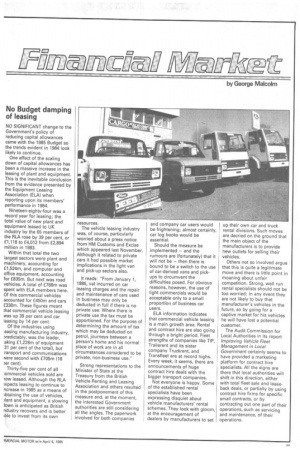No Budget damping of leasing
Page 57

If you've noticed an error in this article please click here to report it so we can fix it.
NO SIGNIFICANT change to the Government's policy of reducing capital allowances came with the 1985 Budget so the trends evident in 1984 look likely to continue.
One effect of the scaling down of capital allowances has been a massive increase in the leasing of plant and equipment. This is the inevitable conclusion from the evidence presented by the Equipment Leasing Association (ELA) when reporting upon its members' performance in 1984.
Nineteen-eighty-four was a record year for leasing; the total value of new plant and equipment leased to UK industry by the 65 members of the RLA rose by 39 per cent, or £1,118 to £4,012 from E2,894 million in 1983.
Within that total the two largest sectors were plant and machinery, accounting for £1,524m, and computer and office equipment, accounting for £835m. But next was road vehicles. A total of £788m was spent with ELA members here. Of this commercial vehicles accounted for £450m and cars £338m. These figures meant that commercial vehicle leasing was up 39 per cent and car leasing by 14 per cent.
Of the industries using
easing manufacturing industry, 3redictably, was the leader, :aking £1,228m of equipment 31 per cent of the total), but :ransport and communications mere second with £705m (18 )er cent).
Thirty-five per cent of all ;ommercial vehicles sold are low leased. Although the RLA .1xpects leasing to continue to ncrease in 1985 as a means of )btaining the use of vehicles, )Iant and equipment, a slowing (own is anticipated as British ndustry recovers and is better ible to invest from its own resources.
The vehicle leasing industry was, of course, particularly worried about a press notice from HM Customs and Excise which appeared last November. Although it related to private cars it had possible market implications in the light van and pick-up sectors also.
It reads: "From January 1, 1985, vat incurred on car leasing charges and the repair and maintenance of cars used in business may only be deducted in full if there is no private use. Where there is private use the tax must be apportioned. For the purpose of determining the amount of tax which may be deducted on petrol, journeys between a person's home and his normal place of work are in all circumstances considered to be private, non-business use."
Strong representations to the Minister of State at the Treasury from the British Vehicle Renting and Leasing Association and others resulted in the postponement of this measure and, at the moment, the interested Government authorities are still considering all the angles. The paperwork involved for both companies and company car users would be frightening; almost certainly, car log books would be essential.
Should the measure be implemented — and the rumours are (fortunately) that it will not be — then there is bound to be a switch to the use of car-derived vans and pickups to circumvent the difficulties posed. For obvious reasons, however, the use of light commercials would be acceptable only to a small proportion of business car users.
ELA information indicates that commercial vehicle leasing is a main growth area. Rental and contract hire are also going through a bright period. Fleet strengths of companies like TIP, Trailerent and its sister company Truckrent, and Transfleet are at record highs. Every week, it seems, there are announcements of huge contract hire deals with the bigger transport companies.
Not everyone is happy. Some of the established rental specialists have been expressing disquiet about vehicle manufacturers' rental schemes. They look with gloom, at the encouragement of dealers by manufacturers to set up their own car and truck rental divisions. Such moves are decried on the ground that the main object of the manufacturers is to provide new outlets for selling their vehicles.
Others not so involved argue that this is quite a legitimate move and there is little point in moaning about unfair competition. Strong, well run rental specialists should not be too worried; in any event they are not likely to buy that manufacturer's vehicles in the future, so by going for a captive market for his vehicles he will have lost a potential customer.
The Audit Commission for Local Authorities in its report Improving Vehicle Fleet Management in Local Government certainly seems to have provided a marketing platform for contract hire specialists. All the signs are there that local authorities will shift in this direction, either with total fleet sale and leaseback deals, or partially by using contract hire firms for specific small contracts, or by contracting out one part of their operations, such as servicing and maintenance, of their operations.




























































































